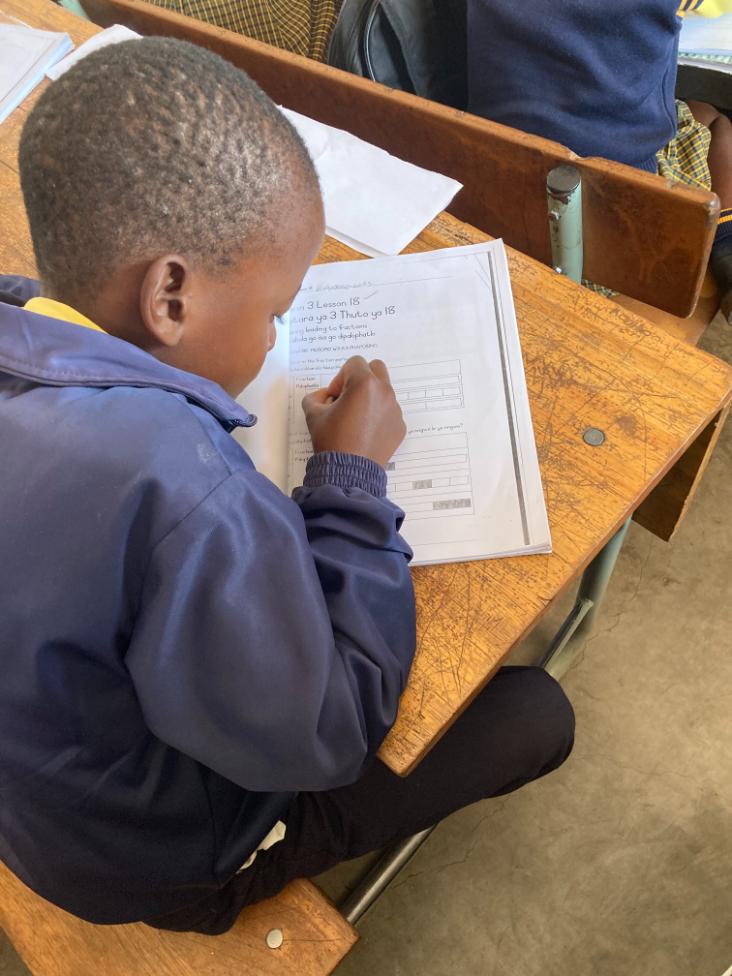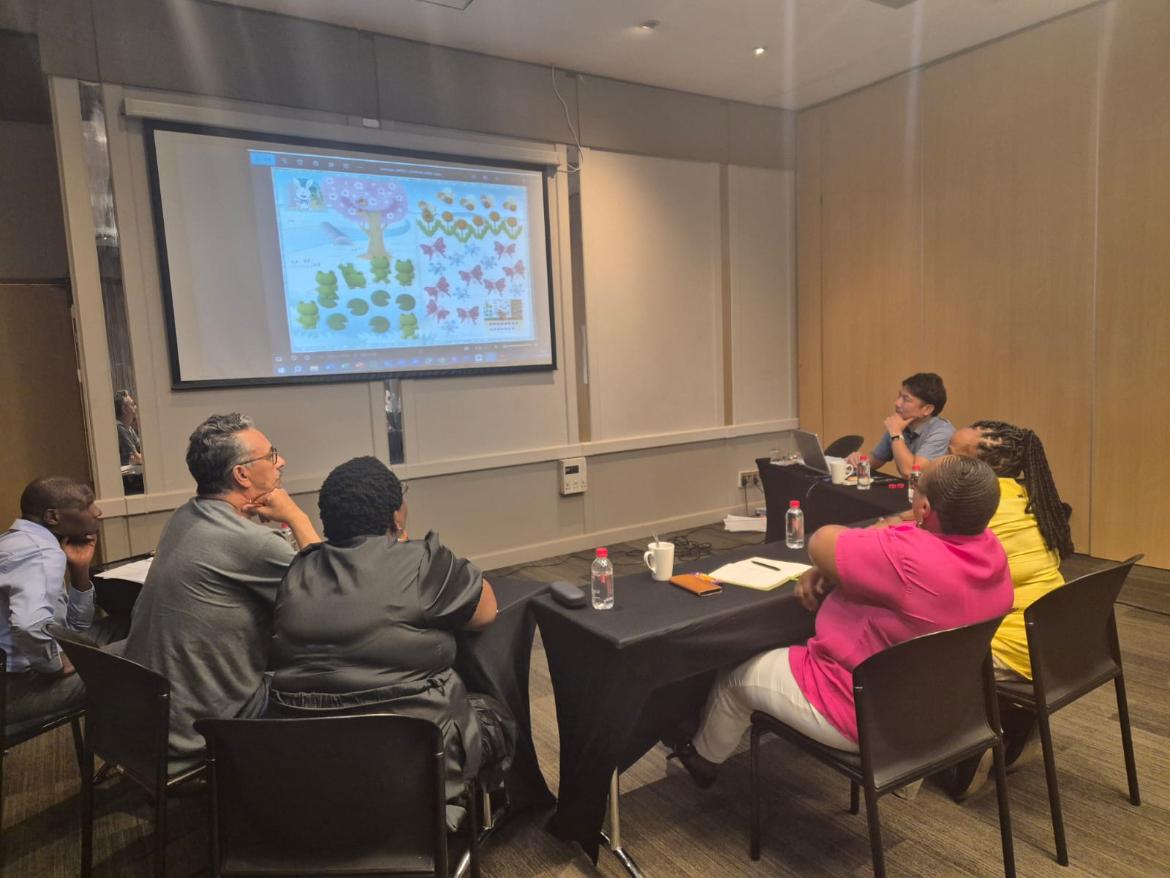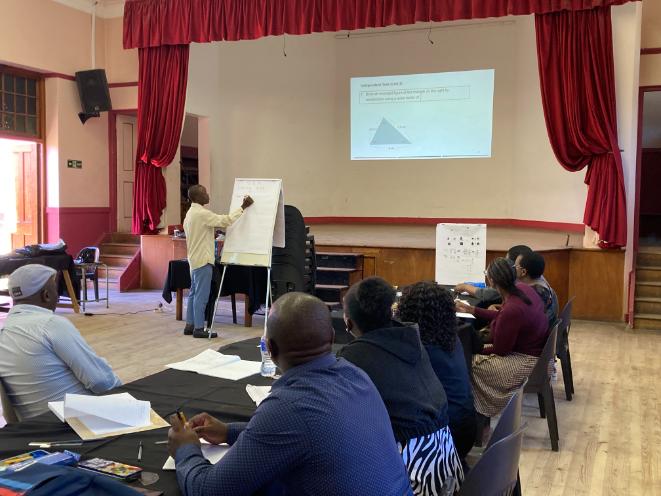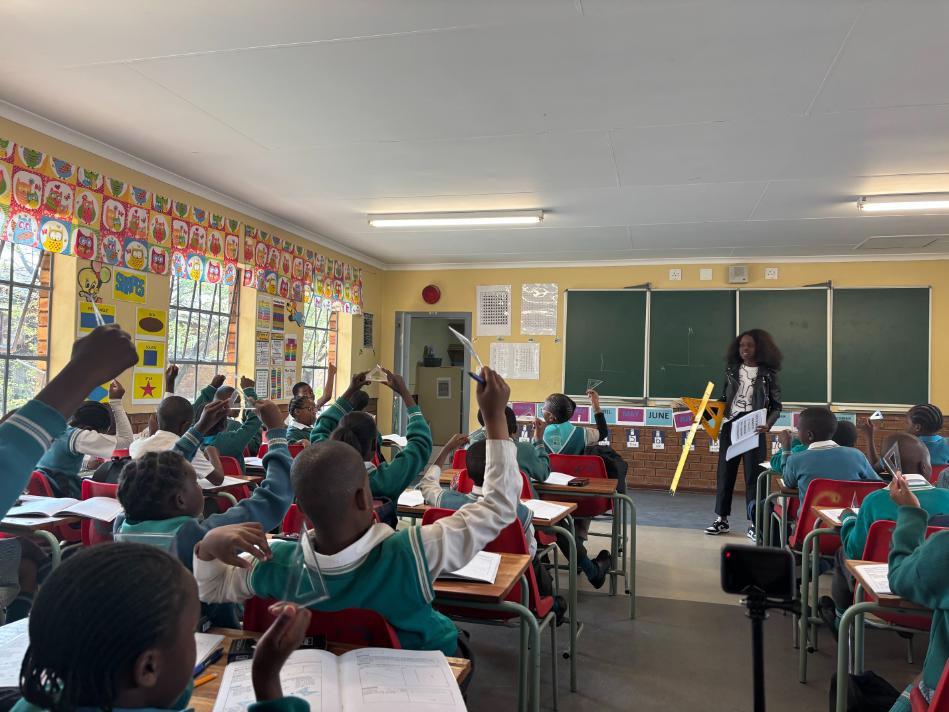――Rainbow Nation――
The Republic of South Africa (below, South Africa) is often referred to as the Rainbow Nation. Even after overcoming the racial segregation policy known as apartheid and achieving democracy, society was in turmoil. The term “Rainbow Nation” is an ideal promoted by former President Nelson Mandela, envisioning a country in which people of different races, cultures and religions can live together free of conflict.
Over thirty years after becoming a democracy, South Africa is facing a variety of challenges, including economic stagnation, deterioration of public order and an energy crisis. The issue of education is particularly serious, with many children having difficulty with basic reading, writing, and mathematical skills. A recent survey had a huge impact on society when it reported that some 80% of 4th graders “had serious difficulty in making meaning from text.”
I have been assigned to South Africa since 2023, working at the National Department of Basic Education as a JICA expert (Expert for Strengthening the Implementation of Mathematics Education). I have been working to adapt Japanese-style mathematics education to the context of South Africa, aiming to enhance schoolchildren’s mathematics skills. In this paper I will describe the current state of and issues in mathematics education in South Africa, the history of cooperation in education by JICA, and the potential of Japanese-style mathematics education.
Current State of and Issues in Mathematics Education in South Africa
There are three factors behind this;
1. Failure to establish the basics in the lower grades
2. Lack of teacher’s lesson delivery skills
3. The language barrier
Failure to establish the basics in the lower grades
In the TIMSS for a certain year, many 5th graders were stuck at the level of 2nd or 3rd graders. Over half of the schoolchildren were unable to do addition or subtraction, and as many as two-thirds were unable to do multiplication and division. The fact that children are moved up to the next grade without having attained a secure footing in the basics in the lower grades is a major problem.
Lack of teacher’s lesson delivery skills
Teachers lack not only knowledge of the subject content, but also teaching know-how; “How to Teach.” It is said that this is due to the fact that many black teachers received their own education under apartheid (Bantu education), which prevented them from being able to fully acquire the basic academic skills. The current situation is that many classes focus on teaching the steps to the solution, with few occasions where the children are asked to consider “Why?” or “How?”. In addition, it is rare for an incorrect answer or misunderstanding to be used as a learning opportunity; misunderstandings are often passed over without resolution.
The language barrier
South Africa has 12 official languages (“sign language” being officially added in 2023), and diversity in the linguistic environment adds to the complexity of education. Pupils in the first to third grades are taught in their mother tongue, but in the 4th grade classes switch to English or Afrikaans, at which point many children become unable to keep up. In addition, the system of mother-tongue education also faces problems, with not enough teaching materials or teachers for each language.

Educational support by JICA and integration with Japanese-style mathematics education
In response to these serious challenges, JICA has been working with South Africa since 1999, and has been working on the improvement of mathematics education for some 25 years.
An account of our support
Support by JICA began with a teacher-training project in a certain province. While this did achieve some results, the effect was limited as the educational system in the country as a whole remained unchanged. Therefore, from 2012 on we have continued to provide support starting at the policy level, with experts being dispatched to the National Department of Basic Education. Compared to other donors most of whom provide short-term support, JICA’s long-term, persevering cooperation has been highly regarded and has built a sense of trust in Japan.
Integration with Japanese-style mathematics education
In 2018 the National Department of Basic Education and JICA working together formulated the Teaching Mathematics for Understanding (TMU)Framework. This new framework integrates curriculum review, teaching material development, teacher training and monitoring; and pilot projects were implemented in 41 schools in 3 provinces.
Experts dispatched from Japan provided technical support with regard to the design of the curriculum, learning and teaching materials and training, and many of the approaches used in Japanese-style mathematics education were incorporated.
For example, a switch was made from the spiral approach (whereby content is repeatedly built upon) to the unit structure approach, in which each unit of study is taught as a single study course. It is hoped that this will clarify the structure of the content and thus enhance the learner’s conceptual understanding. In addition, reference was made in the development of teaching materials to the coherence and structure of Japan’s textbooks and teacher’s manuals.
-
 Workbook development
Workbook development -
 A teacher-training mock lesson
A teacher-training mock lesson
Strengths of Japanese-style mathematics education and future potential
What is important is not the introduction of Japanese methods just as they are used in Japan, but their flexible adaptation (glocalization) to conditions in South Africa. In this regard, the presence of experts with a long-term presence in the area who can bring to their work an understanding of the local context is a major strength. For example, in promoting the development of learning and teaching materials, the suggestion of a word problem with a situation that would be quite common in Japan can often bring a look of incomprehension to the faces of local contributors. When this happens, I make a point of discussing with them what kind of situations they usually use, and whether they are effective in enhancing the children’s ability to learn. It is my opinion that going through this process achieves glocalization and enables the development of learning and teaching materials the ownership of which is in the hands of the local people.
In my opinion, there are three advantages to Japanese-style mathematics education;
1. A systematic curriculum
2. Textbooks and teacher’s manuals that support problem-solving classes
3. Continues teacher development focusing on lesson studies
These correlate to the challenges faced by many African countries, not least South Africa; and it is here, I believe, that it is meaningful for Japan to continue to cooperate in the field of mathematics education.
Finally, I think Japan itself has a lot to learn from the process of glocalization through the educational cooperation with South Africa that I have just described. For example, the “South Africa-style Lesson Study Model” that was created based on the Japanese Lesson Study is gradually spreading throughout South Africa. A feature of this South Africa-style Lesson Study is that compared to the Japanese model it places more emphasis on collaborative activities by multiple teachers. It is anticipated that this will enable teachers in South Africa to effectively develop their own teaching skills and ability to work together with colleagues. This kind of example could provide us an opportunity for the review of lesson studies being implemented in Japan at present, and for their development into something better. Breaking out of a relationship of giving and receiving support, to a relationship of learning from each other…. That, I believe, is the true value of international cooperation.

Bibliography
Venkat, H & Roberts, N. (2022). Early Grade Mathematics in South Africa Mathematics. Oxford University Press.
Department of Basic Education. (2024). South African 2023 Trends in International Mathematics and Science Study (TIMSS) Highlights Report.
+++++++++++++++++++++++++++++++++++++++++++++++++++++++++++++
■Profile of the Author
ITAGAKI Akiho
Japan International Cooperation Agency(JICA)Expert
Career:After graduating from university, in 2010 was dispatched to the Independent Republic of Samoa as a Science and Mathematics teacher with Japan Overseas Cooperation Volunteers. On returning to Japan worked as a teacher at a public high school in Japan. After undertaking a graduate course, took part in JICA technical cooperation projects including the “Project for Expansion of New Curriculum in Mozambique (PRICEP),” working as a Development Consultant for Koei Research & Consulting Inc. From May 2023 to the present, has been assigned to South Africa as an individual expert in the practical reinforcement of arithmetic education.







